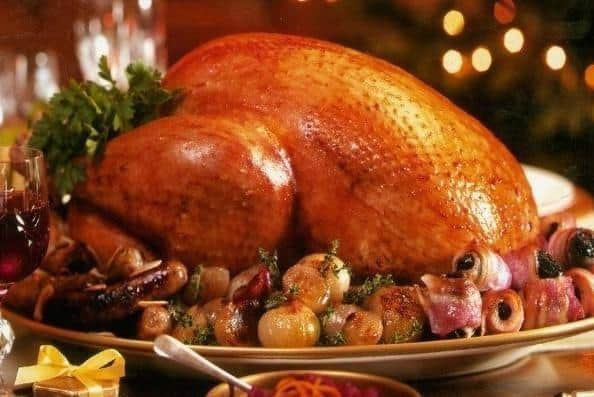Rising cost of food is the biggest concern for families cooking Christmas dinner this year - more than half having to cut back on expenditure
and live on Freeview channel 276
They say almost two-thirds (62%) of households in Northern Ireland say that the rising cost of food is the biggest concern with cooking Christmas dinner this year with more than half (54%) swapping full turkeys for turkey crowns or joints.
As households get ready for the festive season, the recent study conducted with 1,000 adults across Northern Ireland, sheds light on the financial impact increased food costs is having on households this Christmas.
Advertisement
Hide AdAdvertisement
Hide AdAlmost two-thirds (62%) of this year’s respondents identified the cost of food as their biggest concern as they plan this year’s Christmas dinner, and this is a notable increase compared to 55% of respondents in 2022.
54% of local home cooks are opting to buy a turkey crown (48%) or a boned and rolled turkey (6%) and this marks a significant increase from last year's data, where just over a quarter (26%) made the decision to make the switch.
The research was commissioned by safefood as part of its annual Christmas food safety campaign, as it encourages home cooks to use a meat thermometer to make sure their Christmas turkey is safely cooked through to 75 degrees Celsius aimed at helping ensure everyone has a safe and tasty Christmas.
Director of Food Safety with safefood, Trish Twohig says: "Our research would suggest people are changing their choice of Christmas turkey amid rising food costs. Whatever kind of turkey you cook this year, using a meat thermometer takes the guesswork out of knowing when it’s cooked.”
Advertisement
Hide AdAdvertisement
Hide Ad“To check that it’s cooked, take it out of the oven and pop the meat thermometer in the thickest part of the meat between the breast and the leg; when it reads 75 degrees Celsius, it’s safely cooked.”
“Meat thermometers are affordable, easy to use and can be used on other meats during the year like chicken, pork, burgers and sausages to ensure they’re cooked all the way through.”
“If you don’t own a meat thermometer, that’s not a problem. To check your turkey is safely cooked, pierce the thickest part with a clean skewer or fork and check that it is piping hot, with no pink meat left and the juices run clear.”
Home cooks can find lots of useful tips and practical guides including an interactive turkey cooking time calculator for all turkey types and Christmas dinner food planner on the safefood website safefood.net/christmas
Advertisement
Hide AdAdvertisement
Hide AdTrish added: “At safefood, we know that cooking Christmas dinner can be stressful for some so we’ve created a dedicated section on our website safefood.net/christmas
It’s stuffed with lots of useful tips, practical guides and tasty recipes. Our Christmas dinner food planner helps you with meal-planning while our recipes have lots of ideas to help you make the most of any leftovers this Christmas.”
- Get your fridge festive ready - Ahead of the festive rush give your fridge a good clean with warm soapy water and re-arrange the shelves to make space for your turkey – you should store it on the bottom shelf.


- How much turkey do you need? - Consider how many people you’re cooking for (children eat less than adults) and whether you want any leftovers. Here’s a guide to the size of turkey you'll need depending on the size of your party.
- 4-6 people: a 3-4 kg turkey
6-8 people: a 4-5 kg turkey
8-10 people: a 5-6 kg turkey
- Give yourself enough time to defrost – If your turkey is frozen, give yourself enough time to defrost it prior to cooking and defrost it on a dish or tray on the bottom shelf of the fridge. Allow 24 hours for every 4-5 pounds/1.8-2.2kg of frozen turkey. You’ll know it’s completely thawed when the body is soft, the legs can be moved and there are no ice crystals in the cavity.
- Don’t wash your turkey - Do not wash your turkey as this can spread harmful bacteria to your sink and kitchen surfaces - proper cooking will kill any bacteria. Handle your turkey as little as possible and remember to wash your hands and any surfaces/utensils with hot, soapy water before you handle any other food.
- How long to cook your turkey? For cooking times to suit your turkey, safefood have a handy turkey cooking time calculator on their website at www.safefood.net/Christmas. To check your turkey is safely cooked, take it out of the oven and pop a meat thermometer in the thickest part of the meat between the breast and the leg; when it reads 75 degrees Celsius, it’s safely cooked. If you don’t own a meat thermometer, pierce the thickest part with a clean skewer or fork and check that it is piping hot, with no pink meat left and the juices run clear.
- Using your leftovers - Always cover any leftovers and place in the fridge within two hours of cooking. Ensure any meat is cooled as quickly as possible – cutting it into pieces will help with this. Once in the fridge, any leftovers should be eaten within three days. When re-heating food, ensure it is piping hot all the way throughout and only re-heated once. Check out www.safefood.net/christmas for some inspiration on leftover recipes.